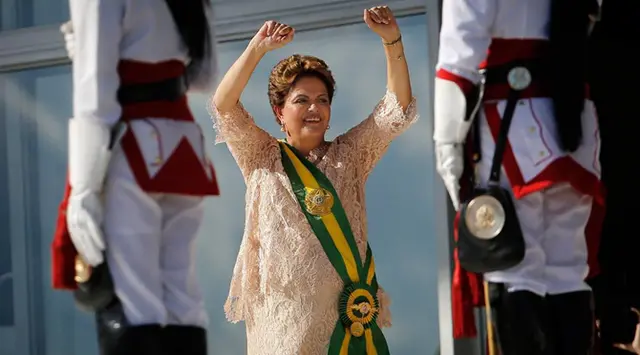By all accounts Dilma Rousseff has made it to the top: She ruled over a larger country than any other female leaders, she was named 2nd most powerful woman in the world by Forbes magazine, and helped organize the first World Cup and summer Olympic Games that her country hosted for the first time.
But her rise to the pinnacle is as spectacular as her fall is dramatic. An impeachment this year apparently ended her decades-long political life that is filled with struggle, controversy, and setbacks.
Rousseff was born in 1947 to a Bulgarian immigrant. Despite her well off family background, she was drawn to socialist ideas and participated in urban guerrilla groups that revolted against the military government in the wake of Brazil’s 1964 coup.
The left-wing groups, in which Rousseff played a leading role, lacked money, weapon and experience gained momentum. In 1970, Rousseff was captured by the authorities and sentenced to jail for six years, for which she served three. She was allegedly tortured during interrogation, according to her own and fellow inmates’ testaments.
She began to actively participate in politics in the 1980s, when she and others founded the Democratic Labor Party,and gradually moved up the ladder, holding posts in municipal and state levels.
In 2000, she left the DLP and joined the Workers’ Party, another left wing group but held more sway in national politics than her original party. She supported Lula da Silva to become the Brazilian President in 2002, and in return was appointed energy minister.
The mentor-protege relationship she developed during this time with Lula was crucial in securing her place as his successor, but her appointment as the energy minister also foretold her fated fall.
Rousseff was raised to Lula’s chief of staff in 2005, and was poised to take over the baton from Lula as he endorsed her as his hand-picked successor. Her approval ratings eroded in her first term, but was barely enough to carry her into her second term in 2014.
By then, the Brazilian economy, which overwhelmingly relied on the export of raw material such as oil and iron ore, was already suffering due to the big price drop of bulk stocks in the global market. Consequently government revenue was devastated, making it hard to pay high welfare that the Workers’ Party pledged for the poor.
Adding to the furor of the people was the Petrobras corruption scandal that emerged in 2014 and exploded in 2015. Codenamed Operation Car Wash, the case exposed a long running link between Petrobras, Brazil’s largest petroleum company, government officials and contractors.
Brazilian prosecutors found that Petrobras would intentionally offer high-cost contracts to other companies in exchange for kickbacks, which authorities estimated to run up to 9 billion U.S. dollars.
Multiple senior officials, including those within Lula or Rousseff’s inner circles were identified to have taken part in the illegal dealing, and while Rousseff denies any link to the case, her past experience in the energy sector and close link to Petrobras itself raised serious doubt among lawmakers.
Fueled by street protest and a string of convictions of Rousseff’s allies, the Brazilian Chamber of Deputies, its lower house of the Parliament, moved to impeach Rousseff in 2015.
In May 2016, she was suspended from her duties by the Senate, and was officially relieved of her post on August 31, when the Senate voted 61-20 in favor of impeachment.
Due to the ongoing investigations, she was absent from the summer Olympics, but she could find some solace in the fact that her successor Michel Temer was booed at the opening ceremony of the Paralympics a week after her impeachment, knowing despite of all the controversy, some Brazilians still have her close to their hearts.
(APD)
 简体中文
简体中文





